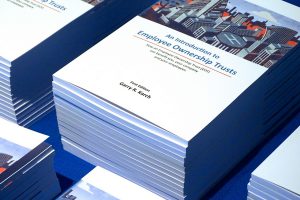Employee Ownership Trust Transactions
The Employee Ownership Trust (“EOT”) offers significant benefits to vendors selling their businesses. As a consequence, change of ownership to an EOT has become an increasingly popular and compelling alternative for vendors over traditional exit routes such as sales to private equity firms or strategic buyers. RM2 focuses on the structuring and raising of capital to support change of control EOT transactions so that vendors get fair value and a path to liquidity.
What are the tax benefits?
Under the EOT structure, selling shareholders receive relief from capital gains tax during the year they sell at least 50% of the company to an EOT. Additionally, the company can pay income tax-free bonuses to employees of up to £3,600 on an annual basis. Finally, the EOT structure is the only structure that permits the use of other types of shares schemes to provide additional incentives to key employees and management.

25 years' experience in employee ownership trust and third party sale transactions, helping business owners realise the value in their businesses. Contact Richard: richard.cowley@rm2.co.uk
Richard Cowley
Corporate Finance DirectorWhat often prevents the adoption of an EOT?
One of the major constraints to the mainstream adoption of employee ownership transactions has been the lack of initial liquidity for selling shareholders. While many owners of private companies may be willing to finance the purchase of their company through vendor financing or vendor notes, creating some liquidity at closing is a key factor in expanding the use of the EOT structure. Despite the proven benefits of employee ownership to both companies and employees, liquidity, financing, tax and legal obstacles have combined to constrain the adoption of change of control employee ownership schemes.
Download Free EOT Fact Sheet
Overcoming the barriers: financing an EOT transaction
When it comes to financing a potential EOT transaction most business owners are not sure what options are available. The current bank is always an option, but most lenders have never financed an EOT sale and need guidance through the process. That is where RM2 adds value. Our professionals have structured, financed and raised capital for over 150 employee ownership-related transactions, over the course of their careers. Having lent into employee ownership transactions, we understand what lenders look for and are able to provide the required information upfront, significantly enhancing and expediting the credit approval process. Additionally, through our numerous relationships in the financing community, we are able to create a competitive process among lenders, ensuring our client receives the optimal terms and conditions for their transaction.
Key Benefits
Criteria
- £3 million- £100 million + in enterprise value
- Strong management team
Transaction benefits
- No capital gains tax for vendors selling more than 50%
- Sell to friendly buyer on flexible terms
- Income tax-free cash bonuses for employees
- Tax advantaged employee share schemes for employees
Transaction process
- Few representations and warranties required compared to third party sale
- Flexible terms to meet shareholder needs
- 3 – 4 month to completion
Business benefits
- Company remains independent
- Vendors can remain involved
- Low risk transaction and minimal disruption
- Founders create a lasting legacy
- Employee engagement through ownership
EOT Transaction services
We provide an upfront feasibility analysis to companies contemplating an EOT transaction. This provides an opportunity for us to get to know one another and allows you to make an informed decision on the suitability of an EOT transaction. Once engaged by you, we will fill two roles:
Corporate Finance
- conduct customary initial due diligence
- create financial models to analyse aspects of the company in light of the transaction
- create a draft transaction financial model incorporating valuation, structure, transaction sources and uses, historical and projected financial and performance analyses
- prepare a financing memorandum to be used as guidance in structuring the senior (typically bank) debt and subordinated vendor notes
- coordinate due diligence activities with prospective lenders and manage communication process leading to the selection of the lender and the resulting commitment to lend into the transaction
Transaction Management
- coordinate legal, accounting, formal valuation and EOT trustee due diligence activities, as appropriate
- coordinate the documentation process with respect to the financing and the EOT transaction itself
- manage, negotiate, structure and execute on all areas of the transaction
- arrange for the appointment of the EOT trustee and arrange any corporate trustee structure
- arrange for the formal valuation opinion addressed to the EOT trustee
- arrange for drafting of the vendor loan notes and associated documentation, sale and purchase agreements, amendments to articles, shareholders’ agreement and employee share schemes
- arrange for HMRC “transactions in securities” clearance
Relevant Resources








